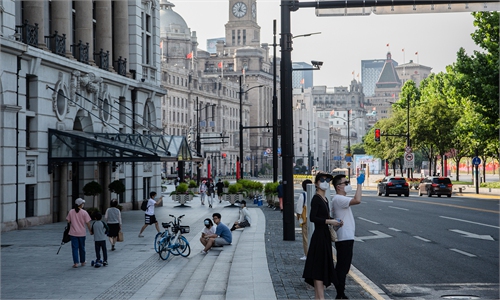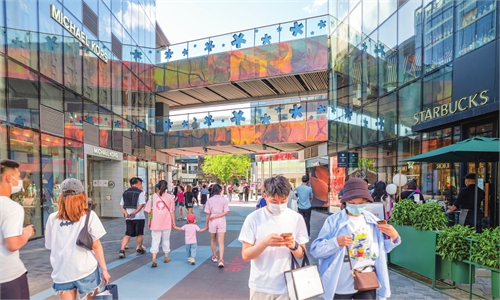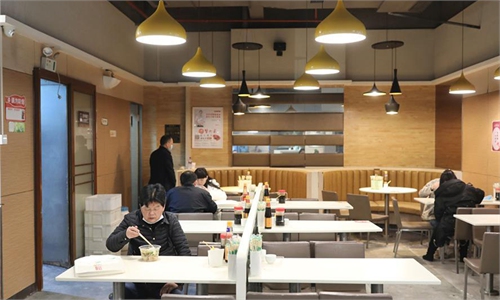IN-DEPTH / IN-DEPTH
Bright spots in epidemic control measures show positive and innovative attitude of Chinese people facing COVID-19 challenge
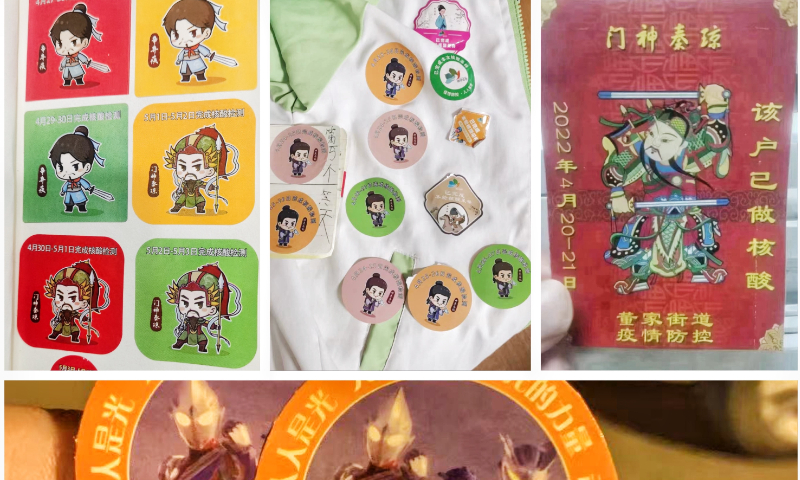
Various stickers during the mass testing in Ji'nan, East China's Shandong Province Photo: Courtesy of Han Xinying
For five-year-old Sun Zhanhang, the original intention was to beat his cousin who got five stickers from taking nucleic acid tests.
In the end, the little boy, who lives in Ji'nan, East China's Shandong Province, collected 19 stickers after completing throat swabs.
"Test Completed Today," read the stickers of different colors and different cartoons.
During a COVID-19 outbreak, from late April to early May, the elaborate-designed, even humorous, nucleic acid test stickers became a trending topic among residents of Ji'nan who went through mass testing in the city.
However, this is not unique to this northern city.
A new way for people in many Chinese cities to meet or greet each other is asking "what style of nucleic acid test certificate did you get today, and what 'anti-epidemic specialty foods' did you eat?"
With China's efficient dynamic zero-COVID policy scientifically and orderly implemented in various cities, the creativity that has emerged alongside the prevention measures has further brightened people's life.
From collecting distinctive nucleic acid testing certificates to modifying COVID-19 antigen self-test kits, the Chinese are embracing a positive, innovative mindset to integrate normalized epidemic prevention and control into their lives, conveying to the world their strong belief in overcoming the virus.
Full of great anticipation
"At first it started in several communities and soon the stickers went viral and became a battle of creativity," Han Xinying, Sun's mother, told the Global Times.
Some are just simple slogans but other communities use beautiful hand-made stickers, and some even put pictures of Ultraman beating monsters, hoping that the virus could be beaten soon.
Yichen, Sun's nine-year-old sister, was jealous to see some people got Ultraman or StellaLou stickers after the tests. But she was motivated to do the test and stopped her fear about it.
After a while, the city's publicity and disease control departments, together with an art company, designed a series of stickers featuring the cartoon figures of historic celebrities and promoted them around Ji'nan.
Xin Qiji, for example, a Chinese poet of the Southern Song Dynasty (1127-1279) born in Ji'nan, became the most popular figure on the stickers because his name "Qiji" means "dropping disease" in Chinese.
"It is a good way to motivate children, and even parents, to participate in the mass testing," Han said adding that "this special lockdown life will be remembered when the kids in the future see the stickers they kept carefully in notebooks."
Many other places in China have also launched a variety of designs for the nucleic acid test certificates.
For example, in Suzhou, East China's Jiangsu Province, the combination of ancient and modern can be seen in the certificates, with content ranging from anti-epidemic slogans imitating the style of the Dream of the Red Chamber, the 24 solar terms, commemoration of important events in history and local landmarks.
"Every day the 'vouchers' surprise the residents. The looks of longing and anticipation are displayed on people's faces as they stand in line waiting for the test," said Chen Zilin, a post-1990s volunteer working in one of the nucleic acid testing sites in Suzhou's Chengnan sub-district, told the Global Times, noting that since the community launched creative nucleic acid testing certificates from the beginning of April, residents have become much more motivated to do the test, and instead of waiting aimlessly or playing with their phones, they discuss the content of the recent vouchers and learn about history and culture from them.
Chen noted that there are many people who frame their nucleic acid test certificates to show them to their friends and relatives.
Recently, vendors are reportedly selling the certificates in Suzhou's Wenmiao antique market.
Recently, residents from Xinjia sub-district in Hangzhou, East China's Zhejiang Province received a carefully crafted voucher after taking a nucleic acid test, which has written on the back different tasks, including cleaning up the advertising stickers on their own door, cleaning the corridor and standing on guard for an hour for their compound. Many residents heard the call and took action.
"Local authorities in China have turn the otherwise boring process of waiting for nucleic acid test into a romantic performance art," Chinese netizens praised these ideas, noting that the small voucher represent the cities' characteristics and also mobilizes the people's sense of participation and achievement.
Laughing at raging outbreak
In the Chinese cities battling the virus, the people are not as resentful and anxious as Western media portray them to be but they are rather showing their courage and optimism when facing the challenges of the epidemic with ingenuity in their daily lives.
For example, many people in Shanghai, most of whom have experienced a two-month long battle against COVID-19 since March, have had the initiative to create a piece of artwork out of the used antigen self-test kits.
Some of them hand-painted the kits with Shanghai's cityscape and Chinese ink paintings of flowers and birds. Others made the kits into Ferris wheels, wind chimes and various accessories.
"Shanghai has always been a city with a taste and when it was hit by the epidemic, most people still chose to document this special experience with a positive mindset," Daisy Huang, a 29-year-old IT professional, told the Global Times, noting that during her time at lockdown she made a pair of earring with the antigen self-test kits. "Even at home, I feel happy when I have time to put on a cool makeup and wear them," she said.
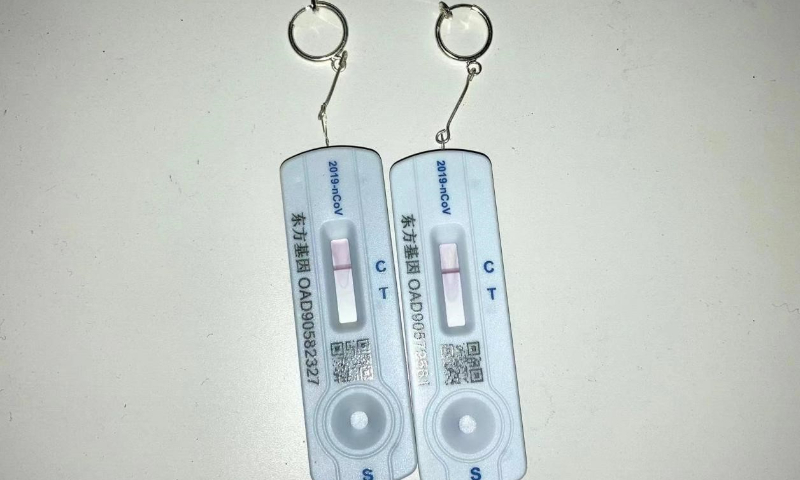
Earrings made by Huang during home quarantine using antigen self-test kits. Photo: Courtesy of Huang
Huang said she would wear the earrings out after the city is completely back to normal. "It is not only a testimony of this special period, but also a medal for Shanghai people's active cooperation with the authorities in their home quarantine."
In China's capital Beijing, which was hit hard by the current wave of the Omicron variant, businesses and residents are showing their understanding and support for the government's epidemic prevention and control initiatives in unique and creative ways.
Currently, restaurants in Beijing dine-in service continues to be suspended after the May Day holidays with many businesses setting up a simple takeaway window and dining car, offering "Green health code cakes," "no pop-up notification on Health Kit" cocktails, and take-out orders with a witty text reminding people to wear masks and actively do their nucleic acid tests.
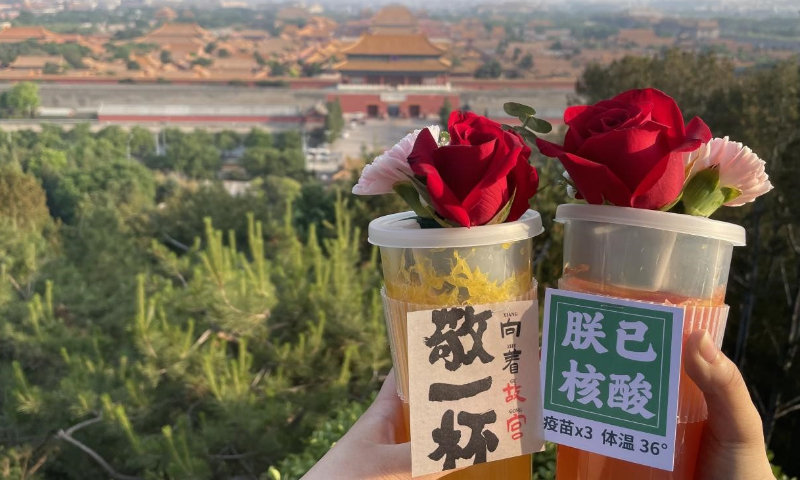
The Jingshan park's anti-epidemic drink (right) purchased by Wang. Photo: Courtesy of Huang
In this weekend, Wang Chen, a 26 year-old fashion magazine editor who has lived and worked in Beijing for three years, went with her boyfriend to the Jingshan Mountain, one of the few parks still open in Beijing, to buy a creative drink, which comes in a cup with the words "I've completed my nucleic acid test and three shots of COVID-19 vaccine. My temperature is 36 C," a text written in the style of an ancient Chinese emperor. She then climbed to the summit of Jingshan Mountain for a photo shoot with the Forbidden City in the background.
There were not many visitors in the park but many of them lined up orderly to buy the drink.
"The words on the cup sleeve are also my current city declaration. Although we now face some difficulties and inconvenience in life, this is all temporary under the careful protection of the government. We are still healthy and our life is still full of many beautiful things," Wang said.

